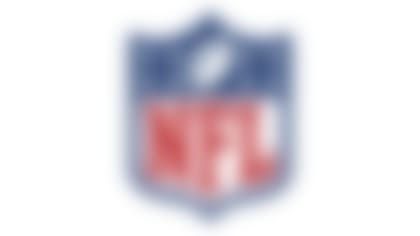Judy Battista served on the 26-person blue-ribbon panel that voted on the NFL's All-Time Team, a collection of the 100 greatest players and 10 greatest coaches in the league's 100-year history. Different positions from this dream team will be revealed each Friday night at 8 p.m. ET on NFL Network through Week 17. Judy will review the selections in this space. This week's reveal included 10 wide receivers:
WIDE RECEIVER (10): Lance Alworth, Raymond Berry, Larry Fitzgerald, Marvin Harrison, Elroy Hirsch, Don Hutson, Steve Largent, Randy Moss, Jerry Rice*, Paul Warfield.
*Denotes unanimous player selection.
* * * **
The wide receivers of the NFL's All-Time Team are likely to be debated, mostly because of the person who is not on the list. Terrell Owens was a finalist, and he would have been a worthy member of the team, too. TO finished with 1,078 receptions for 15,934 yards and 153 touchdowns. He is third in receiving touchdowns (behind Jerry Rice and Randy Moss, both of whom made it) and third in career receiving yardage (behind Rice and Larry Fitzgerald, who also made it), although he was second in both categories -- behind only Rice -- at the time of his retirement.
Owens had an exceptional three-season stretch in the early 2000s. His greatest game, though, was Super Bowl XXXIX, when he had nine catches for 122 yards in the Eagles' narrow loss to the Patriots, playing against doctors' advice just seven weeks after Owens broke his leg and tore a ligament in his ankle.
But Owens was left off, and, like the voting for the Pro Football Hall of Fame, that is likely to raise questions. Owens was elected to the Hall of Fame in his third year of eligibility, and part of the reason he did not get in on his first two tries was his behavior with teams during his career. Owens played for five teams over 15 seasons, and he clashed with front office personnel and teammates on several of them. It's hard to say if that is why Owens did not make the all-time list -- nobody on the panel said as much, and we do not know how each other voted -- or if he ran into the same problem so many other stellar players at every position did: There were so many great candidates but so few spaces open.
On the surface, it would seem to be especially difficult to compare wide receiver candidates over the 100 years of NFL history, given how dramatically the league has tilted toward the passing game in recent decades -- and how little contact defenders are allowed to have with more recent receivers. But take a look at the careers of Don Hutson and Elroy "Crazylegs" Hirsch. Hutson, who played for the Green Bay Packers in the 1930s and 1940s, was the first receiver to catch 50 passes (it was an 11-game season), in 1941, when he was named the league's Most Valuable Player. In 1942, he won the award again, after he caught 74 passes, 17 of them for touchdowns. The touchdown record was so far ahead of its time that it was not broken until 1984, when Mark Clayton -- catching passes from Dan Marino -- had 18 touchdown receptions in a 16-game regular season. Only four players have exceeded Hutson's mark in the 77 years since he set it, and it is elite company: Clayton, Rice, Moss and Sterling Sharpe.
The first person to challenge Hutson's touchdown receptions mark was Hirsch, who tied it in 1951, part of an extraordinary season for Hirsch. In those 17 touchdown receptions, Hirsch averaged 51.2 yards, making him one of the game's greatest big-play threats. He set an NFL record with 1,495 receiving yards in just 12 games, an average of 124.6 receiving yards per game -- a record that stood for nearly 20 years. To this day, only two players -- Charley Hennigan in 1961 and Wes Chandler in 1982 -- have averaged more. The most recent player to get close: Calvin Johnson, who averaged 122.8 yards per game in 2012.
So, yes, Hutson and Hirsch were both selected to the all-time team, Hutson one of three who were selected unanimously. Raymond Berry was a unanimous pick, too. Berry joined with Johnny Unitas to form an extraordinary tandem for the Baltimore Colts. He led the NFL in receptions for three straight seasons and caught a then-record 631 passes for 9,275 yards and 68 touchdowns in his 13 seasons. His greatest moment game in the NFL's renowned "Greatest Game Ever Played": the 1958 championship that went to overtime. Berry had 12 catches for 178 yards and a touchdown, but nearly as extraordinary is an under-the-radar achievement: Berry fumbled only once in 13 years.
The third receiver who was a unanimous selection is the greatest to ever play the position and could make an argument as the greatest player in the history of the game. Rice had 11 straight 1,000-yard receiving seasons, and in 1987, he set an NFL record with 22 touchdown caches -- in just 12 games, due to a players strike. That record stood for 20 years, until Moss broke it with 23 touchdown receptions in 2007.
No wide receiver in history played more than Rice's 20 seasons. When his career was over, he held almost every significant receiving record, including for career receptions, receiving yards, total touchdowns and most 1,000-yard receiving seasons. He was a first-team All-Pro in 10 seasons.
Rice played so long that the final year of a career that began in 1985 overlapped with the rookie season of only the second active player to be named to the all-time team thus far. In his 16 seasons, Fitzgerald has posted five 100-catch seasons and is second in career receptions and receiving yards, and sixth in career touchdown receptions. Longevity and consistency have been Fitzgerald's greatest calling cards. He has missed just six games in 16 seasons and he has averaged 86 catches per season. After his rookie campaign, he has never caught fewer than 63 balls in a season and has caught 60.9 percent of the passes that targeted him. Through 15 seasons in the league, he had 97 more receptions than Rice in his first 15 years, despite the fact that Fitzgerald played just two seasons with Pro Bowl quarterbacks (Kurt Warner and Carson Palmer).
The list also includes the only player from the Miami Dolphins' perfect 1972 season to make it thus far: receiver Paul Warfield, who spent five of his 13 seasons in Miami. Critics may wonder why a receiver whose numbers do not match up to some of the other luminaries is on the list, but Warfield's candidacy is a perfect example of considering the circumstances. He played almost exclusively on ball-control style teams, but still caught 427 passes for 8,565 yards and 85 touchdowns. He is also one of the greatest long-ball threats in history, with a career average of 20.1 yards per catch, which still ranks fourth in the league. His speed was used by the Dolphins as a threat to open up the running game -- and in 1972, the Dolphins rushed for a then-record 2,960 yards.
Follow Judy Battista on Twitter @judybattista.












